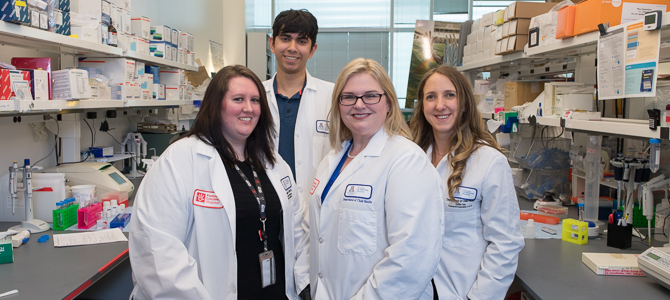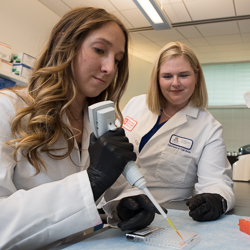
UA Researcher Receives $1.65M Grant for Innovative Technique to Assess Traumatic Brain Injury

A scientist at the University of Arizona College of Medicine – Phoenix has received a $1.65 million grant to find out how a traumatic brain injury (TBI) changes communication in the brain.
The project marks the first time an electrochemical assessment will be used to evaluate traumatic brain injury in real time.
Theresa Currier Thomas, PhD, a researcher in the Department of Child Health, will test initial and delayed changes in brain communication as a consequence of a brain injury by using microelectrodes that record neural signals. Dr. Thomas is also an assistant professor at Barrow Neurological Institute at Phoenix Children's Hospital and a research investigator at the Phoenix VA Health Care System.
"After a brain injury, the communication among neurotransmitters can change, causing abnormalities or differences in the processes," Dr. Thomas said. "Electrochemistry is a laboratory approach to measure how neurotransmissions change in real time."

"Traumatic brain injury can be devastating because of the real risk it brings for permanent effects that can alter the course of a person's life," said UA President Robert C. Robbins. "The groundbreaking work that Dr. Thomas is doing to understand what's happening in the brain after a serious injury is crucial to developing more effective treatments. I look forward to following her progress and learning what she's able to discover."
As part of the grant, Dr. Thomas will study the long-term effects of rehabilitation after a brain injury, as well as the differences in how men's and women's brains recuperate after a TBI. Because TBI is reported more often in men than women, the majority of previous research has focused on males.
"We have overlooked how often traumatic brain injuries, including concussions, occur in both men and women," she said.
Each year, more than 2.5 million Americans survive a TBI. Of those survivors, 20 to 50 percent develop delayed or persistent traumatic brain injury-associated symptoms or aggravate pre-existing symptoms. These can include problems with cognition, sensory processing, communication and behavior, as well as mental health due to injury-related pathological processes that impair the activation and function of brain circuits. The multiplicity of symptoms impedes or can complicate return to routines, daily activities, personal relationships and employment.
"Treatment strategies for post-traumatic morbidity are limited and usually are treated based on the symptoms that manifest," Dr. Thomas said. "Alternative treatment approaches include rehabilitation therapy. Yet, since the underlying mechanisms that result in the delayed and persisting post-traumatic morbidity are not fully understood, it is difficult to have a standard treatment paradigm in place."
Because late-onset symptoms are unpredictable in TBI and can have detrimental influence on relationships, employment and quality of life, Dr. Thomas said she hopes that — through her research — diagnoses, treatment and patient education can be improved.
The five-year grant, No. R01NS100793, is from the National Institute of Neurological Disorders and Stroke.
About the College
Founded in 2007, the University of Arizona College of Medicine – Phoenix inspires and trains exemplary physicians, scientists and leaders to advance its core missions in education, research, clinical care and service to communities across Arizona. The college’s strength lies in our collaborations and partnerships with clinical affiliates, community organizations and industry sponsors. With our primary affiliate, Banner Health, we are recognized as the premier academic medical center in Phoenix. As an anchor institution of the Phoenix Bioscience Core, the college is home to signature research programs in neurosciences, cardiopulmonary diseases, immunology, informatics and metabolism. These focus areas uniquely position us to drive biomedical research and bolster economic development in the region.
As an urban institution with strong roots in rural and tribal health, the college has graduated more than 1,000 physicians and matriculates 130 students each year. Greater than 60% of matriculating students are from Arizona and many continue training at our GME sponsored residency programs, ultimately pursuing local academic and community-based opportunities. While our traditional four-year program continues to thrive, we will launch our recently approved accelerated three-year medical student curriculum with exclusive focus on primary care. This program is designed to further enhance workforce retention needs across Arizona.
The college has embarked on our strategic plan for 2025 to 2030. Learn more.